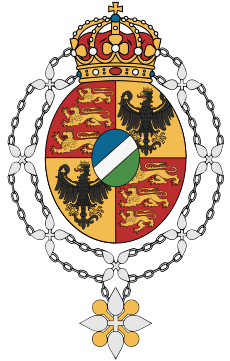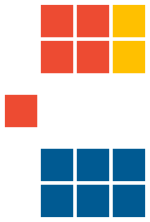Reichsversammlung
Reichsversammlung Parliament of the Abeldane Empire | |
|---|---|
| 14th Reichsversammlung | |
 | |
| Type | |
| Type | |
| Houses | Bundesrat Volkstag |
Term limits | 1 year (Bundesrat) 6 months (Volkstag) |
| History | |
| Founded | 6 June 2014 |
| Leadership | |
Bundesrat Deputy President | Ashley Jaax, C since 13 September 2020 |
Volkstag Deputy Speaker | Ashley Jaax, C since 11 April 2020 |
| Structure | |
| Seats | 19 6 bundesräte 13 MVs |
 | |
Bundesrat political groups | HIM Government (4):
HIM Loyal Opposition (1):
Vacant (1):
|
 | |
Volkstag political groups | HIM Government (6):
HIM Loyal Opposition (7):
|
| Elections | |
| Party list | |
Volkstag last election | 28-29 July 2020 |
Volkstag next election | 27-29 December 2020 |
| Meeting place | |
| Discord | |
| Website | |
| reichsversammlung.weebly.com | |
The Reichsversammlung (literally "Imperial Assembly", in German), and also known in English as the Parliament of Abelden, is the legislative body of the Abeldane Empire. It is a bicameral legislature, consisting of the Bundesrat and the Volkstag.
Members of the Bundesrat are elected or appointed in the manner deemed fit by each federal state. Members of the Volkstag are elected through party lists in single nationwide electoral district. There are presently twelve elected seats in the Reichsversammlung, plus one appointed seats.
The current Reichsversammlung is in its fourteenth session since the foundation of the legislature on 6 June 2014, although it has seen changes and reforms along the way. Originally named as the Abeldane Parliament, it was renamed to Reichsversammlung in 2015 to fit the German naming conventions present in the rest of the Abeldane state's institutions.
The Reichsversammlung is responsible for enacting and repealing laws (known as the Acts of the Parliament). Additionally, the Reichsversammlung can overturn decrees enacted by the Emperor.
History
Originally called the Parliament of the Abeldane Empire, it was formed on June 6, 2014. Its main role was to advise the Monarch on his decisions and had a symbolic role in governance. Although tasked with creating new laws or Acts and the promulgation of the constitution, this never came a reality and Acts passed by the Parliament from 2014 until 2015 were primarily created by the Monarch and passed by him or her under the Parliament's name. Members of the Parliament, or MPs, were appointed by the Monarch and represented a constituency/city or no constituency at all. They served at the Monarch's pleasure and remained until their resignation or dismissal by the Monarch.
The Prime Minister and his cabinet were members of the Parliament and the Prime Minister and Deputy Prime Minister were required to be MPs. From 2014 until 2015, the Parliament had only met once for a session and therefore a ceremonial part of government.
The powers of the Reichsversammlung increased over the next few years, in tandem with the growing Abeldane democracy. In 2017, elections to the Reichsversammlung were instituted, replacing the previous system of appointment.
The most radical changes in the history of the Reichsversammlung came in August 2020 when, through the far reaching Constitutional Reform Act of 2020 the chamber was transformed from its traditional unicameral form, into a bicameral legislature. The Reichsversammlung as it had existed before the reforms became the new lower chamber, the Volkstag, whilst a new upper chamber, known as the Bundesrat was constituted.
Powers
The Reichsversammlung is the primary legislative body of the Empire. According to the Abeldane Constitution, the Reichsversammlung has the exclusive right to legislate on:
- trade and commerce
- taxation
- bounties on the production or export of goods, but so that such bounties shall be uniform throughout the Empire
- borrowing money on the credit of the Empire
- the naval and military defence of the Empire and of the several states
- census and statistics
- currency, coinage, and legal tender
- bills of exchange and promissory notes
- bankruptcy and insolvency
- copyrights, patents of inventions and designs, and trademarks
- naturalization and aliens
- corporations
- the federal judicial process
- immigration and emigration
- the relations of the Empire with other nations
- conciliation and arbitration for the prevention and settlement of industrial disputes extending beyond the limits of any one state
- matters referred to the Reichsversammlung by the legislatures of any state
- matters incidental to the execution of any power vested by the Constitution in the executive, legislature or judiciary
Duration
Reichsversammlung terms last 6 months, with there being held a general election following the dissolution of every Reichsversammlung. As such, terms for the Volkstag are 6 months. Terms for the Bundesrat however are 1 year, with terms being staggered, so half the Bundesrat is selected every general election.
Presiding officers
Bundesrat
Volkstag
The Volkstag is presided over by a Speaker. The speaker is elected by the members of the Volkstag following the resignation of the previous speaker, or whenever there is a challenge for the speakership. The Speaker of the Volkstag sets the agenda for each legislative meeting, and is tasked with chairing sessions and keeping order. The Speaker is aided and, if needed, deputised by 3 deputy speakers, also elected by the Volkstag in the same manner as the Speaker.
Parties
The table below lists parties currently represented in the Reichsversammlung.
| Name | Ideologies | Leader | Jun. 2020 result | Current seats | ||||
|---|---|---|---|---|---|---|---|---|
| Votes (%) | Seats | Volkstag | Bundesrat | |||||
| NRGU | National Royalists - The Green Union Nationale Köningstreue - Die Grüne Union |
Royalism | Patrick Renwick | 52.6% | 7 / 14
|
6 / 13
|
3 / 6
| |
| C | Confederals Konföderative |
Confederalism | Connor Stumperth | 31.6% | 4 / 14
|
5 / 13
|
1 / 6
| |
| LF | Liberty Front Front für Freiheit |
Liberalism | Brandon Wu | 15.8% | 2 / 14
|
2 / 13
|
0 / 6
| |
Composition and seats
| Abelden |
| This article is part of the series |
| Politics and government of the Abeldane Empire |
| Constitution |
|---|
| Reichshöchsgericht |
| Foreign relations |
| Political parties |
Combined, the Reichsversammlung's two houses have a total of 19 seats. The members of the Bundesrat are elected or appointed in whatever manner their respective state government sees fit. The Volkstag however, is a popularly elected body. All twelve elected seats in the Volkstag are currently delegated by the party list electoral system, in which Abeldane citizens vote for political parties. Then, the votes are proportionally used to determine how many seats each political party will get in the Volkstag.
Before the federalization took effect, each MPs were appointed per city/town that served as their respective constituency because of the low administrative regions in Abelden. Although crown dependencies and territories before will only have one representation in the Reichsversammlung, representing them as a crown dependency or a territory and not by cities. Each cities served as a seat. Reform afterwards changed the system in which each state was delegated seats. However, for the December election, Abelden switched to the party list system still used today. As per the Reichsversammlung (Composition) Act 2018 there is one appointed seats, a representative of the Monarch's choosing, known as the Imperial Representative.
The number of seats have increased and decreased through the Reichsversammlung's history. Seats increased only when new cities were created and MPs were chosen to represent them. After federalisation, the seats were de facto fixed for the first time and each state were proportionately given seats according to their population and an automatic seat given to the Monarchs. The Reichsversammlung reached its peak number of seats at 42, but did not last long and there were plans for reforming the seats. As plans for an elected Reichsversammlung came in the scene, the seats had to be decreased and following the August 2017 elections, the seats were fixed for the first time and were not distributed by state and decreased from 36 to 16. After the reform, seats have increased rarely and has not gone up to more than 18 seats.
Bundesräte
| Bundesrat | Federal Party | State Party | State | Took office | Notes | ||
|---|---|---|---|---|---|---|---|
| Nicolas von Uberquie y Millan | National Royalists | Green Royalists | 30 August 2020 | ||||
| Carl von Joseph Werzberg | National Royalists | Royalist | 10 September 2020 | ||||
| Patrick Renwick | National Royalists | None | 15 August 2020 | ||||
| James Frisch | None | Democratic | 5 September 2020 | President | |||
| Ashley Jaax | Confederals | Batu | 15 August 2020 | Deputy President | |||
| Vacant | N/A | N/A | N/A | ||||
| Non-voting Representative | |||||||
| Thomas Bainbridge | Confederals | None | 5 September 2020 | Imperial Representative | |||
Members of the Volkstag
Notes
